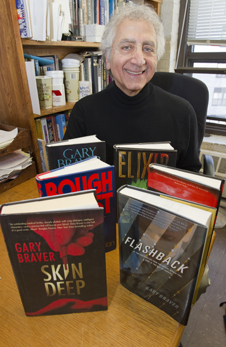3Qs: Northeastern novelist speaks of “vision”

On June 21, Northeastern University English professor Gary Goshgarian will release his eighth novel, “Tunnel Vision,” which follows an atheist who lapses into a coma and wakes up on Easter reciting the Lord’s Prayer in Aramaic. We asked Goshgarian, who will sign copies of the novel at the Northeastern Bookstore on its release date, about the concept behind the book, his pen name and his advice for aspiring novelists.
Near-death experiences and the search for an afterlife figure prominently in “Tunnel Vision,” which explores the relationship between science and religion. How did you come up with the idea?
The notion of intentionally flat-lining someone to explore brain activity intrigued me. It’s illegal, so it’s never been done before, but I thought I could explore the possibilities in a novel. So, I read up on near-death experiences and found that quite a few people have claimed to have died and gone down a tunnel into a big wash of light. In this tunnel, they see spiritual beings and dead relatives and feel a sense of unconditional love. This fascinated me.
From Christianity to Islam and some sects of Judaism, many religions promise an afterlife. That promise of continuance is a big question in science. Is the mind reducible to a series of neurological networks or is there something beyond the physicality of the brain?
You authored your first three novels under your own name, but adopted a pen name more than a decade ago. Why did you make the switch and how did you settle on the nom de plume Gary Braver?
In 2000, I wrote a book about an anti-aging drug called “Elixir,” which was optioned for a feature film by director Ridley Scott, of “Gladiator” fame. My publisher got excited and didn’t want to under-order copies of the book based on sales of my previous novel. So, she asked me to change my name in order to debut me as a “new” author and publish 10 times as many copies of the book.
I had three days to come up with a short name at the front of the alphabet. There is strong evidence that customers who browse the new-releases section in chain bookstores, such as Barnes & Noble, stop at around “H” or “I.” I consulted my family tree and ended up on my grandfather, who was killed by the Turks in the 1920s. As it turned out, his first name translated from Armenian into English as “Braverman,” so I went with gramps.
What advice do you have for aspiring novelists?
Look at a book the way a carpenter looks at a house. Be aware of how an author gets in and out of a scene and the ways in which he or she shapes character through dialogue or description. Take note of the structure of a scene and be aware of the rising and falling action of each chapter, which should create tension between what the character wants and what he fears.
Keep writing. I write every day. Even if I’m not at the keyboard, I’m taking notes or thinking about a scene. Turn off the TV.





